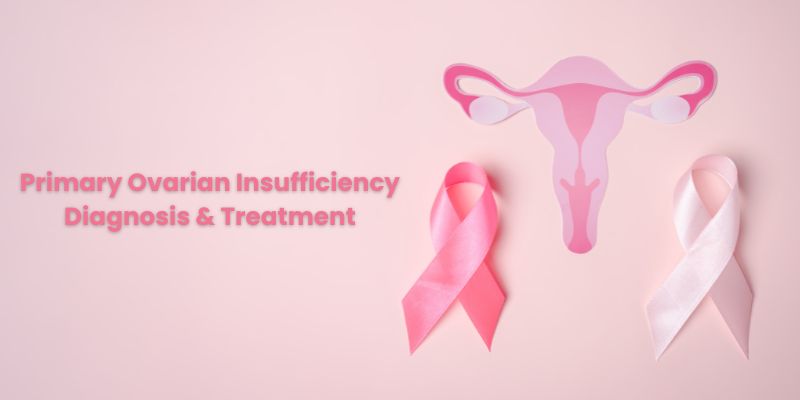



Primary ovarian insufficiency rarely manifests as a symptom in most women, but if you experience irregular periods or are having difficulty getting pregnant, your doctor may suspect the disease. Physical examinations, often pelvic exams, are used to make diagnoses. Your gynecologist in Ahmedabad may inquire about your menstrual cycle, history of ovarian surgery, exposure to toxins during chemotherapy or radiation therapy, and other medical conditions.
Your healthcare practitioner may suggest one or more examinations to look for:
•Pregnancy: If you are of childbearing age and have missed a period, a pregnancy test looks for signs of an unplanned pregnancy.
•Hormone Levels: Numerous hormones, such as follicle-stimulating hormone (FSH), estradiol, a form of estrogen, and prolactin, a hormone that promotes the production of breast milk, may be measured in your blood by your physician.
•Chromosome Changes Or Certain Genes: A karyotype analysis blood test may be performed on you to check for any odd chromosomal alterations. Your physician may also do an FMR1 gene test to determine whether you carry the gene linked to Fragile X syndrome.
The majority of the time, treating primary ovarian insufficiency concentrates on the issues brought on by low estrogen. The possible course of treatment are:
•Estrogen Therapy: Osteoporosis prevention is possible with estrogen therapy. Hot flashes and other signs of low estrogen can also be relieved by it. If you still have your uterus, you should take progesterone along with estrogen. You are increasing progesterone guards against alterations that can result in cancer to the endometrium, the lining that lines your uterus. Merely taking estrogen may be the source of these alterations. Long-term estrogen and progesterone therapy have been associated with an increased risk of breast cancer and heart and blood vessel problems in elderly women. Hormone therapy is beneficial in young individuals with primary ovarian insufficiency, compared to its hazards.
•Calcium & Vitamin D Supplements:Elderly women who receive long-term estrogen and progesterone therapy may be at higher risk of developing breast cancer as well as heart and blood vessel issues. When weighed against the risks, hormone treatment is helpful for young people with primary ovarian insufficiency. How much vitamin D is best taken every day still needs to be determined. Eight hundred to one thousand international units (IU) per day through diet or supplements is an excellent place to start. Your medical provider may recommend more vitamin D if your blood levels are low.It could be extremely upsetting to find out you have primary ovarian insufficiency. However, you should be able to live a healthy life if you receive the right care and attention.
•Learning About Other Ways To Have Children: Discuss your alternatives with a medical practitioner if you want to grow your family. For example, consider attempting in vitro fertilization with donor eggs. Another option is to adopt a child.
•Talking With a Doctor About Best Healthcare Option: When they engage in sexual activity without using a condom, a tiny percentage of persons with primary ovarian insufficiency end up pregnant. If you wish to avoid getting pregnant, consider utilizing birth control.
•Keeping Bones Strong: Have a diet high in calcium. Engage in weight-bearing activities like walking and upper body strength training. Additionally, abstain from smoking. Find out from your medical team if you require calcium and vitamin D supplements.
•Keeping Track Of Menstrual Cycle: Get a pregnancy test if you are taking hormone therapy that causes you to have a monthly cycle and you miss a period.
Most likely, a gynecologist or your primary care physician will perform your initial examination. You may be directed to an expert in reproductive hormones and enhanced fertility if you're seeking therapy for infertility. Reproductive endocrinologists are doctors like the one in question.
Ask if there is anything you need to do ahead of time when you schedule the appointment. For example, you might have to abstain from eating for hours before an exam. We refer to this as fasting.
•Your Symptoms: Mention any missed periods and the duration of your absences
•Key Personal Information: Note down your family's medical history, current life changes, and significant stressors.
•Your Health History: Including your reproductive history is crucial. Information regarding your use of birth control, any pregnancies, and nursing may be included in this. Make a note of any previous ovarian procedures you may have had, as well as any time you may have been exposed to radiation or toxins
Consider taking a family member during the checkup. This person can help you remember all the information your healthcare team gives you. Some of the questions you can ask your lady gynecologists in Ahmedabad are the likely cause of irregular periods, the tests you may require, the available treatments, and their possible side effects